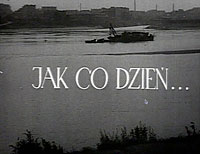 Jak co dzień…
Jak co dzień…
Poland, 1955, black and white, 12 mins
Made as a Łódź Film School project, Day In Day Out, Kazimierz Karabasz’ lyrical portrait of the daily morning journey of Warsaw’s suburban commuters, has hardly dated at all: my fellow Londoners will find themselves nodding in recognition on numerous occasions, even if hanging onto the sides of moving carriages is frowned on these days (at least in Europe).
The film begins with a montage of scenes in the suburbs just after sunrise, with only a few people already active. But this trickle turns to a flood as the camera approaches the station – little more than a platform-free building. A steam train pulls out so slowly at first that one man jumps off and runs to a carriage further back to get a better grip. Meanwhile, other commuters prefer to cycle or cram themselves onto what look like former army trucks or treacherous-looking buses. (“Time for some morning exercise”, chuckles the commentator as a few run after it). The accompanying music, whose jaunty rhythms recall Rossini’s William Tell Overture, is in fact the third movement from Shostakovich’s Sixth Symphony.

The vehicle of choice (90% of commuters, apparently) seems to be the electric train, for good reason: it’s by far the fastest and most efficient system of transport, needing only sixty seconds at each stop. At this point, the focus of the film changes from the commuter to the workers behind the scenes, with Karabasz emphasising how much work is required to ensure this sometimes misleading appearance of seamless efficiency. As the commentary puts it: if you’re minded to complain about a 10-minute delay, you have these people to thank for ensuring that it was that brief. Delightfully old-fashioned mechanical phones allow communication up and down the line, vital in case anything goes wrong. “As a passenger you have no idea what a rascal you are travelling on”, says the commentator, before highlighting the 603 train as being particularly troublesome.
I haven’t seen Where The Devil Says Goodnight (Gdzie diabeł mówi dobranoc, 1956), Karabasz’s first professional documentary (UPDATE: I have now), but it’s worth noting that it was included in one of the NFT’s Free Cinema programmes (the fourth, dedicated to Polish cinema, screened from 3-6 September 1958). On the evidence of the earlier film, there’s a clear affinity between what both Karabasz and his British counterparts were doing in creating genuinely poetic treatments of material that might be banal or didactic in other hands.

Mikołaj Jazdon comments in the booklet accompanying PWA’s DVD release that “it is astounding that not a trace of the all-prevailing Socialist Realism can be found in his theme, approach, commentary or filming methods”, and it also stands apart from trends in many mainstream British documentaries of the time. I recently watched a brace of National Coal Board newsreels from the late 1940s and 1950s whose raw material is sometimes not dissimilar to Karabasz’s, but the commentator is determined to shoehorn everything into an explicitly pro-NCB propagandist line – and Karabasz could easily have turned his film in to a paean of praise for the Polish railway system merely by changing one or two sentences. That he didn’t gives some hint of the direction his career would take, though later films drop the commentary altogether.
- Director: Kazimierz Karabasz
- Writer: Kazimierz Karabasz
- Camera: Zbigniew Karpowicz
- Assistants: Władysław Ślesicki, Nikola Todorow, Karol Dąbrowski
- Production Company: Państwowa Wyższa Szkoła Filmowa (Łódź Film School)
Included on Polish Audiovisual Publishers’ two-disc survey Polish School of the Documentary: Kazimierz Karabasz (Region 0 PAL), the print is in surprisingly good condition considering its age and status as a film-school project, and the subtitles seem comprehensive enough. They’re also in sync, which sadly isn’t always the case on this release. Culture.pl offers a good English-language overview of Karabasz’ career, though the piece doesn’t mention this film.